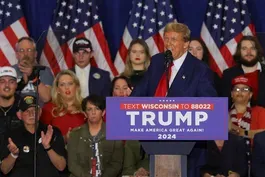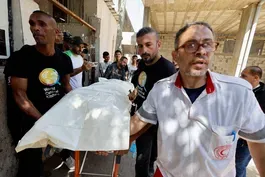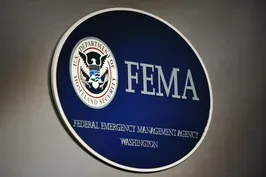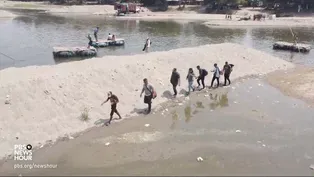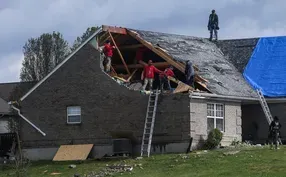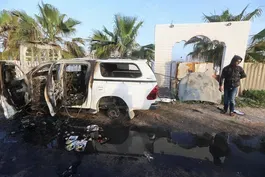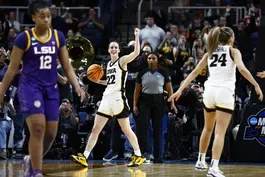
Primary protest votes hint at challenges for Biden and Trump
Clip: 4/3/2024 | 4m 16sVideo has Closed Captions
Primary protest votes hint at November challenges for Biden and Trump
Tuesday, voters in Wisconsin, New York, Connecticut and Rhode Island turned out for their states’ presidential primaries. White House correspondent Laura Barrón-López reports on what the results mean for the upcoming election and discusses the latest NewsHour/Marist poll on voter attitudes to the frontrunners and election integrity.
Problems with Closed Captions? Closed Captioning Feedback
Problems with Closed Captions? Closed Captioning Feedback
Major corporate funding for the PBS News Hour is provided by BDO, BNSF, Consumer Cellular, American Cruise Lines, and Raymond James. Funding for the PBS NewsHour Weekend is provided by...

Primary protest votes hint at challenges for Biden and Trump
Clip: 4/3/2024 | 4m 16sVideo has Closed Captions
Tuesday, voters in Wisconsin, New York, Connecticut and Rhode Island turned out for their states’ presidential primaries. White House correspondent Laura Barrón-López reports on what the results mean for the upcoming election and discusses the latest NewsHour/Marist poll on voter attitudes to the frontrunners and election integrity.
Problems with Closed Captions? Closed Captioning Feedback
How to Watch PBS News Hour
PBS News Hour is available to stream on pbs.org and the free PBS App, available on iPhone, Apple TV, Android TV, Android smartphones, Amazon Fire TV, Amazon Fire Tablet, Roku, Samsung Smart TV, and Vizio.
Providing Support for PBS.org
Learn Moreabout PBS online sponsorshipGEOFF BENNETT: Last night, voters in Wisconsin, New York, Connecticut and Rhode Island turned out for their state's presidential primaries.
For more on the results and what this means for the upcoming election, White House correspondent Laura Barron-Lopez joins us now.
So, Laura, four primaries last night.
What were the biggest takeaways?
LAURA BARRON-LOPEZ: So, President Biden and former President Donald Trump both won their primaries, respectively, but two notable takeaways.
There was a larger-than-expected turnout of uncommitted voters in states like Wisconsin, where it received about 8 percent of the vote.
Those uncommitted voters, as you know, Geoff, are Democratic voters that are upset with President Biden because they want him to take more swift action for a cease-fire in Gaza.
And then also Nikki Haley voters -- there are still a number of Republicans that are voting for Nikki Haley.
And in a state like Wisconsin, she got nearly 13 percent of the vote.
GEOFF BENNETT: And we understand we have some fresh polling.
Polling, of course, is a snapshot in time, not a predictor.
But where does this rematch between Donald Trump and President Biden stand right now?
LAURA BARRON-LOPEZ: So the new polling released today by "PBS NewsHour," Marist and NPR says that President Biden has a small two-point lead over Donald Trump nationally.
That's within the margin of error.
Then, according to a new Wall Street Journal poll, it's a razor-thin margin between President Biden and former President Trump in the key battleground states of Georgia, Michigan, Nevada, Pennsylvania and Wisconsin.
But Donald Trump is clearly leading President Biden in two other battleground states, Arizona and North Carolina, by five and eight points respectively.
Crucial to note in that poll, Geoff, is that RFK Jr., the independent front-runner, has around 11 percent of the vote across these swing states.
And then I just want to go back to our poll for a minute because -- and highlight that another key data point in our poll is on voters' views of political violence.
And it shows that 20 percent of Americans believe that they may have to resort to violence to -- quote -- "get the country back on track."
And when you break that down further, you see that 28 percent of Republicans agree with that sentiment, compared to 12 percent of Democrats and 18 percent of independents.
GEOFF BENNETT: And, Laura, returning to this so-called uncommitted movement, these voters who are voting uncommitted against President Biden, and then the protest votes we're seeing against President Trump, driven in part by Nikki Haley supporters, based on your reporting, how do you see that evolving?
LAURA BARRON-LOPEZ: So, with the uncommitted vote, those are Democrats, as I noted, that are clearly very upset with President Biden, and they're exercising this as a protest vote.
I spoke to one of these uncommitted voters recently who said that they're not necessarily in the abandon President Biden camp, but that they want to exert this protest and that hopefully they feel like they could maybe end up voting for President Biden come November.
And so the question is, ultimately, do they stay home, do they protest-vote, or do they actually go back to President Biden?
Then, when you look at Nikki Haley voters, where do they go next?
President Biden's team is actively courting these voters.
And I spoke to Sarah Longwell, a Republican strategist who conducts focus groups with a number of Republicans, including two-time Trump voters who aren't necessarily happy with the former president, and they have expressed this frustration.
MAN: At this point, Trump has been charged with 91 criminal charges.
So do you want a president who is indicted and perhaps found guilty?
And in so many situations, we don't even hire people for jobs if they have a criminal history.
LAURA BARRON-LOPEZ: Another voter, a white 68-year-old female who voted for Trump in 2016 and then President Biden in 2020, said that former -- that Trump's talk of retribution and revenge scares her.
And so she also very well could end up voting for President Biden again.
And then I just want to make clear, Geoff, that when you're looking at uncommitted voters and Nikki Haley voters, they're very different.
Uncommitted voters aren't necessarily persuadable for President Trump, whereas Nikki Haley voters, both President Biden's campaign, as well as anti-Trump Republicans like Sarah Longwell, think that they are persuadable and could go to President Biden.
GEOFF BENNETT: Laura Barron-Lopez, thanks so much.
I appreciate it.
LAURA BARRON-LOPEZ: Thank you.
Anatomy of a Donald Trump speech
Video has Closed Captions
Clip: 4/3/2024 | 7m 10s | Anatomy of a Donald Trump speech (7m 10s)
Andrés accuses Israel of deliberately targeting WCK members
Video has Closed Captions
Clip: 4/3/2024 | 2m 28s | José Andrés accuses Israel of deliberately targeting World Central Kitchen members (2m 28s)
FEMA administrator on expanding access to disaster relief
Video has Closed Captions
Clip: 4/3/2024 | 6m 26s | FEMA administrator discusses expanding access to disaster relief (6m 26s)
The journey asylum seekers make through Mexico to reach U.S.
Video has Closed Captions
Clip: 4/3/2024 | 10m 37s | A look inside the journey asylum seekers make through Mexico to reach U.S. border (10m 37s)
News Wrap: Storm system brings tornadoes to South, Midwest
Video has Closed Captions
Clip: 4/3/2024 | 4m 39s | News Wrap: Storm system brings tornadoes to South and Midwest, snow to New England (4m 39s)
Retired military officials discuss Israeli aid convoy strike
Video has Closed Captions
Clip: 4/3/2024 | 8m 39s | Was Israeli strike on aid convoy negligence or accident? Retired military leaders weigh in (8m 39s)
Women's college basketball's historic rise in viewership
Video has Closed Captions
Clip: 4/3/2024 | 6m 22s | Can women's college basketball sustain its historic rise in viewership? (6m 22s)
Providing Support for PBS.org
Learn Moreabout PBS online sponsorshipSupport for PBS provided by:
Major corporate funding for the PBS News Hour is provided by BDO, BNSF, Consumer Cellular, American Cruise Lines, and Raymond James. Funding for the PBS NewsHour Weekend is provided by...
